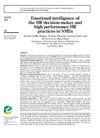Please use this identifier to cite or link to this item:
https://accedacris.ulpgc.es/jspui/handle/10553/55907
| Title: | Emotional intelligence of the HR decision-maker and high-performance HR practices in SMEs | Authors: | Cuéllar Molina, Deybbi García Cabrera, Antonia Mercedes Déniz Déniz, María de la Cruz |
UNESCO Clasification: | 531104 Organización de recursos humanos | Keywords: | Emotional intelligence High-performance HR practices HR decision-maker Small and medium- enterprises |
Issue Date: | 2019 | Journal: | European Journal of Management and Business Economics | Abstract: | Purpose The purpose of this paper is to examine the influence of the emotional intelligence (EI) of the person in charge of making human resource management (HRM) decisions on the adoption of high-performance human resource (HR) practices in small- and medium-sized enterprises (SMEs). Design/methodology/approach This study takes evidences from 157 HR decision makers in SMEs who autonomously make the decisions in the HR area and were responsible for the HR practices in their firm. The authors used multiple linear regression analysis to test the hypotheses. Findings Results show that both the EI and the different EI competencies of which it is comprised affect the adoption of various HR practices. Thus, the main theoretical contribution of this work stems from the incorporation of a psychological variable (EI) as an antecedent of HRM. Managers of the SME will find guidance about which emotional competencies are the most important for them to be more successful in their roles and for improving HRM. Research limitations/implications First, the sample of firms the authors studied is limited to a specific geographic area in one country – Spain (Canary Islands) – that will necessarily limit generalisation of the results obtained to other populations of SMEs. Researchers should replicate the current model in other geographic areas. Second, and with regard the methodology, researchers could explore other tools to measure EI and emotional competencies. It would be interesting to measure this construct using qualitative analytical techniques, with 360 – or 180 – degree tools. Finally, the current study is cross-sectional in nature, which limits our ability to draw causal inferences from the data. This cross-sectional design prevents us, for example, from analysing EI’s influence on the continued development of high-performance HR practices over time. Future research using longitudinal methodologies to study these variables could provide additional advances in this area. This work makes important contributions to both the literature and the business world. With regard to the theoretical implications, results confirm that EI as a whole, as well as in terms of its specific emotional competencies, affects the decision making related to the adoption of high-performance HR practices, which is known to contribute to the organisational performance. Practical implications With regard its practical implications, SMEs’ owners-managers and HR practitioners may find our results and conclusions interesting. Indeed, recommendations in business management have often been accompanied by new approaches in HRM (Kent, 2005), as this study proposes. In particular, managers will find evidence of how a decision-maker’s higher EI propitiates the adoption of high-performance HR practices, thus being able to improve HRM in their SMEs. Moreover, managers will obtain guidance on which emotional competencies are the most important for adopting each HR practice, and so find greater success in their HRM roles. SMEs could organise programmes to develop the HR decision-maker’s emotional competencies, as large firms do for their executives. Originality/value Thus, the main theoretical contribution of this work stems from the incorporation of a psychological variable (EI) as an antecedent of HRM. Managers of the SME will find guidance about which emotional competencies are the most important for them to be more successful in their roles and for improving HRM. | URI: | https://accedacris.ulpgc.es/handle/10553/55907 | ISSN: | 2444-8451 | DOI: | 10.1108/EJMBE-10-2017-0033 | Source: | European Journal of Management and Business Economics [ISSN 2444-8451], v. 28 (1), p. 52-89 |
| Appears in Collections: | Artículos |
SCOPUSTM
Citations
46
checked on Jun 8, 2025
WEB OF SCIENCETM
Citations
30
checked on Jan 18, 2026
Page view(s) 5
99
checked on Jan 10, 2026
Google ScholarTM
Check
Altmetric
Share
Export metadata
Items in accedaCRIS are protected by copyright, with all rights reserved, unless otherwise indicated.
